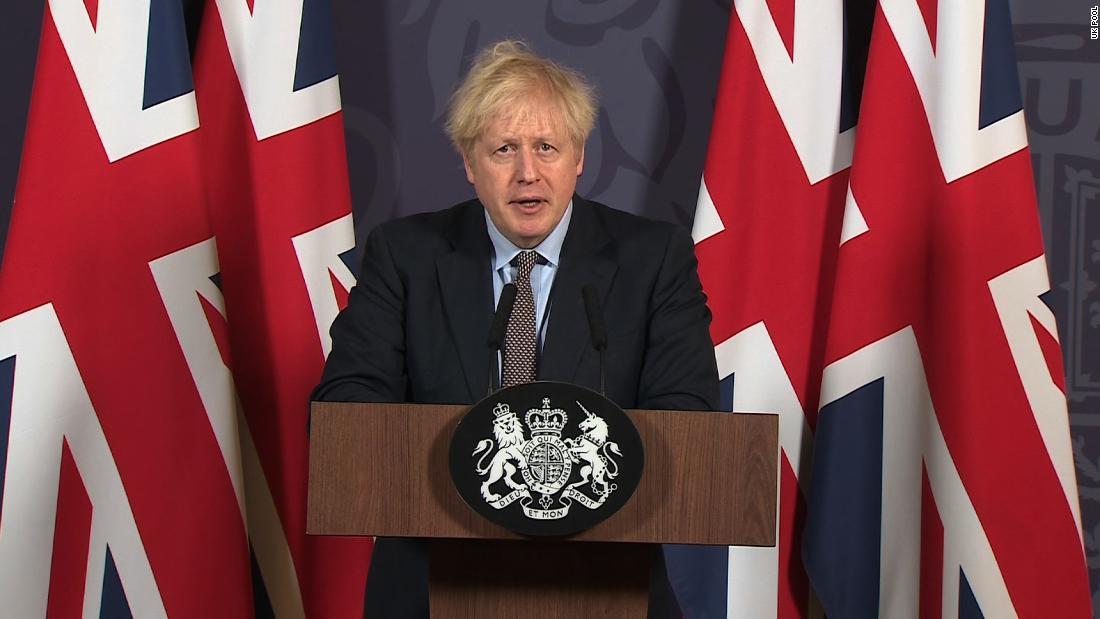
The end of the transition period, four and a half years after a majority in the UK voted to leave the European Union, is a significant moment in the country’s history. After nearly five decades as part of the bloc, the UK will now take a separate path.
British Prime Minister Boris Johnson said on Thursday that Britain will be an “open, generous, outward-looking, internationalist and free-trade country” that is “free to do things differently, and better if necessary” than the EU.
“We have our freedom in our hands and it is up to us to make the most of it,” Johnson said in his New Year’s address just hours before the end of the transition period.
Johnson opened the debate on the bill on Wednesday, telling MPs that the deal would “open a new chapter” and allow the UK to “take control of our laws and our national destiny.”
But critics warn that the UK economy will suffer as a result of Brexit, with many companies unprepared for the coming changes, especially as the nation teeters under the impact of the coronavirus pandemic.
Now that the UK has left the internal market and the customs union, goods crossing the border will be subject to customs and other controls. Delays and disruptions can occur when carriers discover they don’t have the proper paperwork or that new software systems collapse under pressure.
Keir Starmer, leader of the main opposition Labor party, warned last week that “there are serious questions about the government’s readiness for the new arrangements” after the negotiations came to an end.
He told Labor lawmakers to back the bill rather than risk the “devastating” consequences if the UK crashes out of the EU without a trade deal. But Starmer said the “thin deal” reached by Johnson’s government “does not provide adequate protection for UK manufacturing, our financial services, creative industries or workplace rights.”
The trade agreement between the EU and the UK did not cover Gibraltar, the British overseas territory at the southernmost tip of the Iberian Peninsula.
Just hours before the transition period expired on Thursday, Spain and the UK announced that a separate draft agreement had been reached on post-Brexit status.
‘Time to leave Brexit behind’
The European Parliament is expected to examine the deal at a later date before it can be formally ratified by the European Union.
The deal agreed with Brussels constitutes a new business and security relationship with the UK’s largest trading partner. It was eventually nailed down after months of stalemate over areas such as fishing quotas, how the UK would use state aid to support UK businesses after Brexit, and legal oversight of every deal closed.
The agreement, which retains Britain’s tariff- and quota-free access to the bloc’s consumers, spares the UK some of Brexit’s most dire possible consequences as it battles a crippling pandemic.
The agreement also appears to mainly concern trade in goods, where the UK has a deficit compared to its EU neighbors, but excludes major service industries such as the financial sector, where it is currently in surplus.
Muted celebrations
Some front pages of British newspapers sounded triumphant on Thursday, despite the potentially rocky road ahead.
“Britain is FINALLY free from the EU,” said the Daily Express, while The Times of London declared, “It’s goodbye to all of that while the Brexit trade deal was signed.”
But the rising number of coronavirus infections could boil down to the hopes of all Brexit supporters to celebrate the end of the transition period on British streets.
More than three-quarters of the UK population is now under the toughest restrictions in the country, aimed at limiting the spread of a new, more contagious variant of coronavirus.
News of that variant led France, along with other countries in Europe elsewhere, to shut down travel from the UK. Given that thousands of trucks were stranded in the British port of Dover in the run-up to Christmas, some observers feared that this also foreshadowed the possible chaos of a no-deal Brexit.
Meanwhile, the full impact of Brexit on Britons living in the EU, as well as EU citizens living in Britain, remains to be seen. The 3 Million, a grassroots organization of EU citizens in the UK, has raised concerns about those who fail to realize that they will have to apply for the EU settlement settlement by the end of June to protect their UK rights.
Agreement with Gibraltar
The agreement in principle between London and Madrid avoids a hard border between Gibraltar and Spain, Spanish Foreign Minister Arancha Gonzalez Laya told a television press conference on Thursday.
This was something many locals, on both sides of the border, feared as the transition period ended, she said.
Gonzalez Laya said a six-month interim period was expected until a new treaty is finalized. Unlike the rest of the UK, Gibraltar will continue to be part of EU agreements, such as the Schengen area, allowing a free flow of people and goods across members’ borders.
“Spain will ultimately be responsible for the application of Schengen in Gibraltar,” said Gonzalez Laya.
British Foreign Secretary Dominic Raab said the UK had a “warm and strong relationship with Spain”.
“Today we worked side by side with the Chief Minister of Gibraltar, and after intensive discussions with the Spanish government, we agreed on a political framework to form the basis for a separate treaty between the UK and the EU on Gibraltar. Send this to the European Commission to start negotiations on the formal treaty, ”he said.
“Meanwhile, all sides are committed to mitigating the impact of the end of the transition period on Gibraltar and, in particular, to ensure border fluidity, which is clearly in the best interest of the people living on both sides.”
CNN’s Vasco Cotovio, Ivana Kottasová and Niamh Kennedy contributed to this report.

